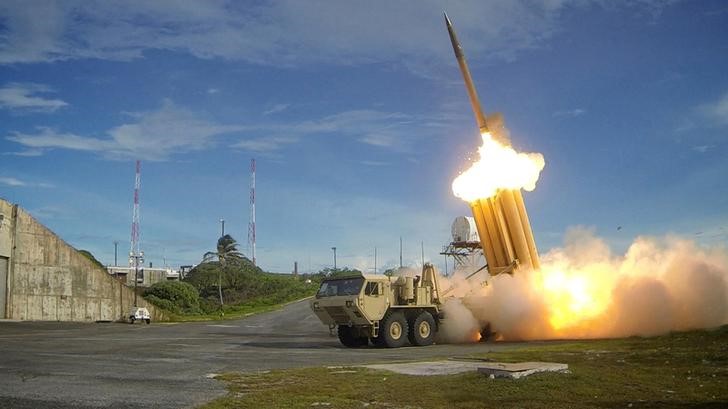SEOUL (Reuters) - The commander of U.S. forces in South Korea said on Friday a U.S. Terminal High Altitude Area Defense (THAAD) anti-missile system battery would be deployed to South Korea within eight to 10 months, an official from the U.S. forces in South Korea said.
The official was commenting on a Yonhap news agency report on remarks made by Vincent Brooks, commander of United States Forces Korea, in which he laid out plans for the deployment.
Brooks said rotating strategic weaponry onto the Korean peninsula would have a deterrent effect against North Korean provocations, according to the agency. He also said the battery would be bigger than one deployed in Guam.
The official could not confirm Brook's comment on rotation, but said the U.S. and South Korean governments are currently in discussions for such strategic weaponry deployment.
In September, two U.S. B-1 bombers flew over South Korea in a show of force and solidarity with its ally following North Korea's fifth nuclear test.
Washington and Seoul have agreed to deploy the THAAD system in South Korea to protect against North Korean threats. China was angered by the decision as its worries that the system's powerful radar can see into its territory.
China's foreign ministry spokeswoman Hua Chunying urged South Korea and the United States to "immediately cease" the deployment process and reiterated that China would take "necessary steps to safeguard China's security interests."
"The U.S. deployment of THAAD on the Korean Peninsula seriously damages strategic balance in the region and seriously harms the strategic security interests of relevant regional countries, including China," Hua told a regular news briefing.
South Korea has said it plans to have THAAD operational by the end of next year at the latest.
Tensions on the Korean peninsula have been high this year, with North Korea conducting two nuclear tests and an unprecedented number of ballistic missile tests.
Tensions on the Korean peninsula have been high this year, with North Korea conducting two nuclear tests and an unprecedented number of ballistic missile tests.
Many in South Korea have called for development of home-grown nuclear weapons or the return of U.S. nuclear weapons to deter North Korea, although South Korea says it has no plans to reintroduce them.
Former U.S. President George H.W. Bush decided in 1991 to remove U.S. nuclear weapons from South Korea.

Brooks, speaking at a breakfast event, also said that relocating tactical nuclear weapons to the peninsula would complicate the situation, the official cited him as saying.